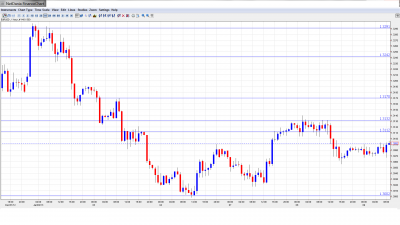EUR/USD was marked by rangebound trading, as the ECB meets for a policy meeting on Thursday, its first of the year. The ECB is not expected to change its benchmark interest rate of 0.75%. The pair showed little change following the announcement on Tuesday that Japan would be purchasing bonds from the ESM. Looking at Tuesday’s economic releases, the markets will be closely watching Eurozone GDP and German Industrial Production.
EUR/USD Technical
- Asian session: Euro/dollar was very quiet, and consolidated at 1.3084. The pair is unchanged in the European session.
- Current range: 1.3030 to 1.3110.
Further levels in both directions:
- Below: 1,3030, 1.30, 1.2960, 1.2880, 1.28, 1.2750, 1.2690, 1.2624, 1.2590, 1.25 and 1.2440.
- Above: 1.3110, 1.3130, 1.3170, 1.3240, 1.3290, 1.3350, 1.34 and 1.3480.
- On the downside, there is support at 1.3030, which appears firm. This is followed by support at 1.30.
- 1.3110 is the next line of resistance.
Euro/dollar edges higher after Japan says it will purchase ESM bonds – click on the graph to enlarge.
EUR/USD Fundamentals
- 10:00 Eurozone Final GDP. Exp. -0.1%.
- 11:00 German Industrial Production. Exp. 1.1%.
- 15:30 US Crude Oil Inventories. Exp. 0.9M.
- 18:00 US 10-year Bond Auction.
For more events and lines, see the Euro to dollar forecast
EUR/USD Sentiment
- Euro Data Disappoints: We may have started a new year, but there hasn’t been much of a change in Eurozone data. After some disappointing PMI’s last week, unemployment continues to be major headache, with the Italian unemployment rate down a notch to 11.1%, and the Eurozone rate stuck at 11.8%. For any recovery to get on track, these kinds of numbers will have to improve. The euro did not react negatively to the data, but more bad economic news will certainly hurt the shaky currency.
- What’s wrong with Germany?: Early on in 2013, the once mighty German economy is showing signs of weakness. After some positive employment and retail sales numbers, this week’s data has been weak. The Trade Balance surplus dropped to its lowest levels since May, and German Factory Orders fell by 1.2%. The markets are expecting better results from German Industrial Production on Tuesday, but a weak reading could undermine confidence in the Eurozone’s largest economy. Chancellor Angela Merkel is seeking a third term in national elections in September, but she will have her work cut out for her if the German economy fails to improve.
- Japan purchases ESM bonds: Japanese Finance Minister Taro Aso stated on Tuesday that Japan plans to purchase bonds from the European Stability Mechanism, which is the Eurozone’s bailout fund. The ESM will begin issuing bonds immediately. This will be the first time that the ESM has issued securities since it was formed last October. Finance Minister Aso said that the move will help bring more stability to the Eurozone, which in turn will also help stabilize the yen and other currencies. Clearly, the Japanese government’s primary motivation in purchasing bonds from the ESM is not to save the Euro-zone or the euro. The purchase of the bonds, which will be made with Japanese yen, will allow Prime Minister Shinzo Abe to continue to weaken the Japanese currency (and strengthen the euro at the same time) without sustaining further criticism from the US and other countries, who are worried about the aggressive economic stance of the new government and its call for unlimited easing by the Bank of Japan.
- Markets shrug off US data: The markets were not impressed with last week’s US employment data, although the numbers were certainly respectable. Non-Farm Employment Change rose to 155 thousand, which was slightly above the estimate of 150K. The Unemployment Rate edged up from 7.7% to 7.8%. However, the November rate was revised to 7.8%, so there was actually no change. ISM Non-Manufacturing climbed to 56.1 points, its best reading since March. This easily beat the estimate of 54.2 points. EUR/USD has not reacted to this recent data, and with only one key US release this week, the Eurozone releases will have added significance.
- Congress braces for February fight: The markets cheered last week’s fiscal cliff agreement in Washington, but it appears that this was just the first of more bruising battles ahead. The hard-fought agreement, which was preceded by months of acrimony and bad blood between the Republicans and Democrats, was criticized by many analysts and economists as a deal comprised of the lowest common denominator which both sides could reluctantly compromise and agree on. However, the agreement left two critical issues for another day – the debt ceiling and spending cuts. The problem is, the clock on those issues is also winding down, as the debt ceiling will be reached in February, and action will have to be taken to avoid a default on the country’s debt. Otherwise, the real possibility of a US default will likely cause turmoil in the markets.

